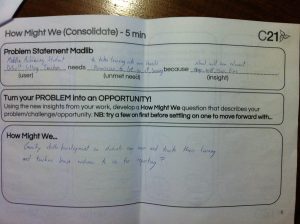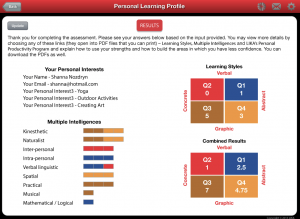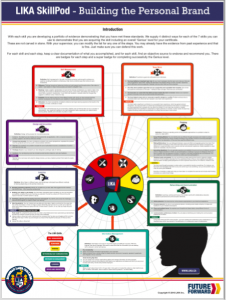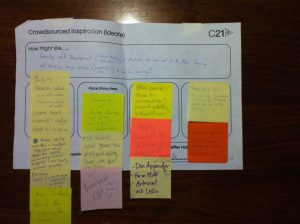Cohort21 continues to be a game-changer for me.
Mentally shifting my previous professional teaching experiences, from schools of well-intentioned colleagues, to this collaborative learning hive of like-minded ed-heads, has transformed my teaching practice in ways I have yet to truly reflect on. Except here:
I walked into the last F2F meeting with more than just a head-cold; I also had a head full of ideas and scatterbrain proposals from which to dump on this unsuspecting source of formative feedback junkies. My new role as Academic Lead at Rosseau Lake College has awarded me the freedom to develop areas of interest that “might” just indeed help our school move forward. Of course, almost instantaneously, the dreaded symbolic starting block reared it’s cosmetically challenged head, in oversized, day-glo sky-writing: Where do I begin?
LEVEL 1: THE WHERE
Luckily, our esteemed facilitators (@jmedved & @gnichols) and coaches at Cohort21, are well-versed in the language of stumble, and had problem-solving solutions waiting in the wings (literally, the wings of the York School hallways, used brilliantly as limbic nerve-system galleries of crowd-sourcing). The Design Thinking worksheets, sticky-note brainstorms and timed exercises, provided by @lmcbeth and Future Design School, were also a wonderfully scaffolded entry point into generative thinking, well away from the usual Saturday PD day-dreaming and doodle sessions of my past.
My original intention was to use the Cohort community as supercharged leverage for reimagining and rebooting our Master Schedule— a commitment to change which RLC (Roseau Lake College) is currently highly invested in. The unique process of design-thinking around this challenge, we began as a school last spring; with typical brainstorming results benefiting most from a speculative standpoint, with the not unusual— sometimes confusing and muddling— side effect of losing some staff through endless permutations of opportunity and critique. Ultimately, I concluded, that, as a school, we were already well ahead in unpacking this sticky-note problem— already at the prototyping phase, really (exciting stuff, TBA!)— and this being too specific a challenge, to be used as my Cohort21 action research springboard.
So, as a poet of pedagogy, as an agent of change, an adjunct adaptor of assessment, and as I am wont to do, I revised my original plan. Not changed tactics so much as I lessened the scope of my (ego)concentric circle to focus on another of my whole-school pet passion projects/peeves: 21st Century Skill Development.
1. Essential Skills from Most Likely to Succeed on Vimeo.
LEVEL 2: THE WHY
I’m certainly not the first teacher to notice the writing on the pedagogical wall; the recent paradigm shift in teaching and learning, away from content and towards competencies, has been slowly evolving over the past decade or more (http://www.p21.org/our-work/resources/for-educators#SkillsMaps). The internet is a far better provider of knowledge than any one teacher could ever hope to be. One only need look at the proliferate example of Khan Academy, how its open-source adaptive technology has enabled a whole new generation of students to effectively tech-learn numeric knowledge in a scaffolded way, previously only possible through linear textbook instruction (Khan has naturally set their sites on literacy and grammar as well: https://www.khanacademy.org/humanities/grammar)
This evolution is a great relief to me, I’ve never been interested in any aspect of teaching that has me churning out cookie-cutter lessons or exacting standardized assessments like a machine; unfortunately, this delicate transition has been an obstacle to some teachers who have, perhaps unconsciously, staked, not only their professional claim, but also their identity around a proven silo of knowledge and/or singular interpretation of curriculum (especially at the secondary school level). I say, let the robots take over all the deductive aspects of school and learning! The computer has already made obsolescence a fact of life in other disciplines such as banking, manufacturing, health, military— why not education? If we, as educators, want to not only stay relevant, but also stay employed in the 21st century, we need to use content to teach skills. We need to become critical and creative facilitators of deeper learning skills and life skills. We need to become Poets of Pedagogy!
LEVEL 3: THE WHAT
After much reflecting and validating (… the Discovery Process…) on a possible teaching problem, and through the integral help of a feedback partner (@vboomgaardt), I finally widdled-down my “mighty” action research question:
How might we gamify 21st century skill development, so students can track their own learning, and teachers can gain meaningful evidence for feedback and reporting?
In order to arrive at this question, I first had to empathize with TWO END USERS in my design problem: both students and teachers. TWO END USERS!?! I think that’s okay, isn’t it? Yes, I think that’s just fine. The students will, of course, be the benefactors of a more streamlined, transparent, credential-focussed, success-driven criteria program around 21st century skill development. The teachers, as well, will need to be able to adapt these competencies and rubrics into their curriculum in ways that deepen and heighten curriculum expectations. If, along the way, we can get all edtech and add an app somewhere in the mix, well, hell, as my grandmother used to say, we’re cookin’ with gas!
Throughout this iterative process, I asked around the cohort to see if other CIS schools had identified “soft skills” as a potential problem worth solving. Similar questions around competencies did indeed exist, however, the conclusion I came to was although every school reported on work habits and had even made inroads into critical and creative thinking, there didn’t seem to be a whole-school system out there for assessing competencies in an intrinsic or adaptive way. It seems to very much still be at the mercy of individual teachers, which doesn’t really signal to the students or parents the importance of this shift in education. One of the simple questions I asked my fellow teachers was this: “What is the difference between a Grade 7 collaboration and a Grade 12 collaboration when it comes to assessing work habits?”. No one was able to give me an answer with any authority or consistency. With this Action Plan, I am to change that.
LEVEL 4: THE HOW
“Curious kids learn how to learn, and how to enjoy it – and that, more than any specific body of knowledge, is what they will need to have in the future. The world is changing so rapidly that by the time a student graduates from university, everything he or she learned may already be headed toward obsolescence. The main thing that students need to know is not what to think but how to think in order to face new challenges and solve new problems.” (p.14)
This is from Amanda Lang’s, The Power of Why. I haven’t read her book, and I probably won’t have time, sadly. Nevertheless, this quote, taken from a MindShift blog about skills education (https://ww2.kqed.org/mindshift/2013/11/14/why-academic-teaching-doesnt-help-kids-excel-in-life/), resonated with my predicament.
When I arrived at Rosseau Lake College last year, they had already started a transition into a new strategic plan (Future Forward) which I am lucky to help continue to shape this year. One of the hallmarks of this plan is a personalized approach to education, using what we call a PLP (Personalized Learning Profile). Partnering with the learning and development company, LIKA (http://www.lika.ca/home2/), our students are able to approximate their learning preference through a multiple-intelligence, psychometric online test. Simply, this allows each student and teacher to see individual learning strengths and weaknesses as a visual quadrant infographic.
In addition to the PLP, LIKA has recently developed a list of 7 Skills which have already been Ministry approved and will form the foundation of RLC’s 21st Century Competencies.
These skills will be the basis for my Action Plan:
- Self-Management
- Teamwork
- Thinking
- Networking and Communication
- Information Management
- Learning
- Design and Innovation
Finally, through the crowd-sourcing inspiration stage of our last F2F, I received a heap of ideas, many of them game and tech-related, to help me on my quest.
LEVEL 5: THE WHEN
It’s all happening in Semester 2. I am lucky to have both Junior and Senior Division Curriculum leads to help co-construct criteria around these skills. There is much research to conduct around badge creation, interactive motivator apps, Google Suite apps, JoeZoo, Doc Appender, and LMS systems. As well, I will be interviewing both of my END USERS throughout the process for feedback and suggestions.
A huge thanks to @ddoucet, @shelleythomas, @jsmith, @brenthurley, @jweening, @egelleny, @timrollwagen, and others I may have failed to mention, for their continued assistance, guidance, and encouragement.
To be continued in PART 2.




